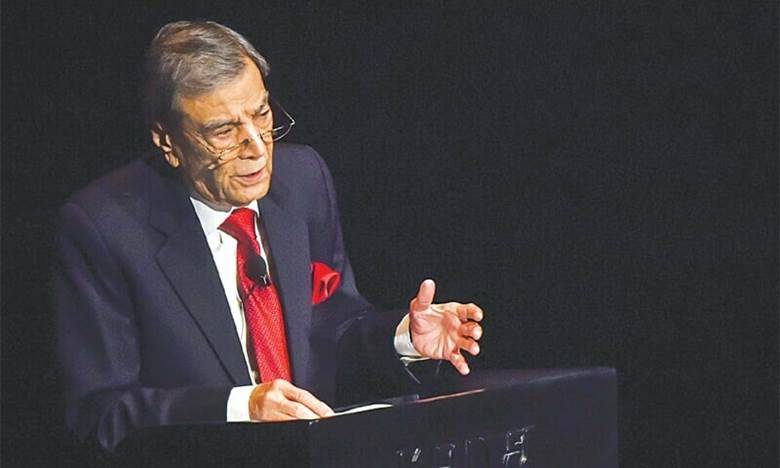
Dawn
Zia Mohyeddin: A Legend Who Took His Final Bow in 2023
By Ras H. Siddiqui

As the year 2023 draws to a close, those whom we have lost come to mind. As we get older, that thought does generally focus on friends and family gone, but one cannot exclude the remarkable individuals who might have crossed our paths through their work and who have left us during the year. Musicians, actors, entertainers, sports personalities, and others make up that list.
In America this year amongst some of the greats we lost include the legendary Norman Lear (TV Producer) at the age of 101, Friends star Matthew Perry at the young age of 54, Suzanne Somers (a day short of 77) of the TV Show Three’s Company, crooner Tony Bennett at 96, Tina Turner, The Queen of Rock & Roll at 83 and actress Raquel Welch who it is hard to believe was 82. The list is long, and this is just a small sample. But what about our old country and its stars and legends who left us this year?
Pakistanis have lost some of its greats in 2023. To name just a few here actors Qavi Khan and Shoaib Hashmi, poet Aslam Islam Amjad, and last but not least, the multitalented Zia Mohyeddin who I believe needed to have a new category named after him because he crossed too many artistic boundaries all by himself. Zia Sahib as we will refer to him here, was a maverick Pakistani stage actor trained at the Royal Academy of Dramatic Art in London during the 1950’s. He had the opportunity there to share the same stage that launched many legendary English and Scottish performers possibly even Sean Connery (of James Bond fame).
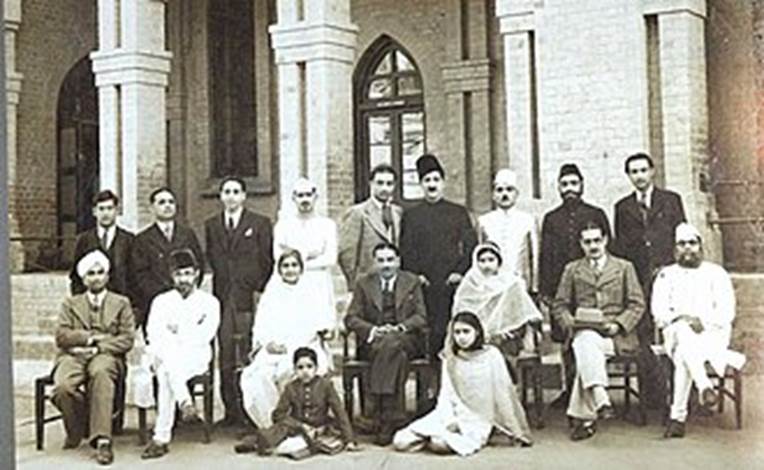
Mohyeddin at the age of 7 (on the floor, left) with the Central Training College Dramatic Club, Lahore, circa 1939. His father, Khadim Mohyeddin, is seated second from right - Wikipedia
Faisalabad (then Lyallpur, British India) born Zia Mohyeddin first became known through his theater role of Dr Aziz in “A Passage to India” (1960), and for his short appearance in the blockbuster movie “Lawrence of Arabia” (1962), along with a handful of other English language films. But all that is well-known and documented. He did not suddenly become an acting sensation for us in Pakistan because his first leading role in the Urdu language film Mujrim Kaun (1970) was not memorable, and the movie itself was equally forgettable. His last film role that one can recall was in Jamil Dehlavi’s “Immaculate Conception” (1992).
It was television that launched Zia Sahib for all of us Pakistanis via “The Zia Mohyeddin Show” (1969 to 1973), and it was from that show that there was no looking back for him or us. We were hooked! Not only did he become a national icon himself, but his show facilitated the rise of other Pakistani show business giants. And before we had ever heard of Rap music on the West Coast here in America, Zia Sahib had already made it famous in Pakistan via his Theka request during his show!
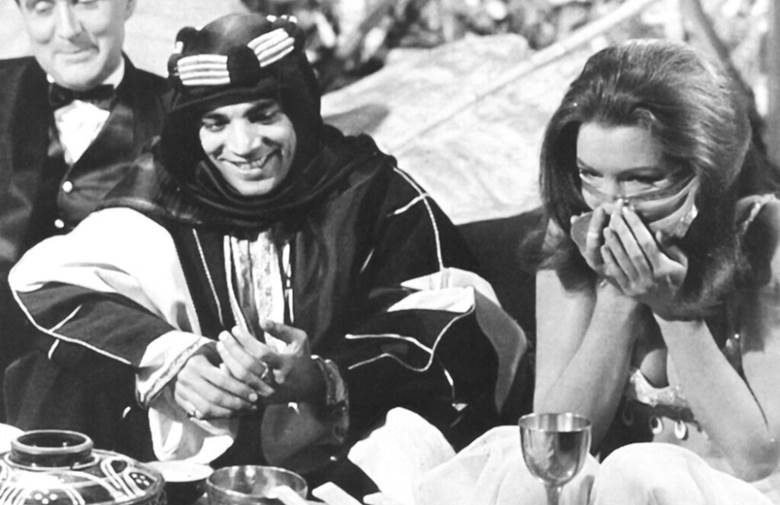
Zia Mohyeddin in a scene from famous British historical film 'Lawrence of Arabia' – Youlin Magazine
He contributed immensely to the cause of Urdu within people of our generation through his superb oratory. This is mentioned here with a bit of regret too, as many of us were educated in Pakistan’s English Medium (sometimes referred to as elite schools) where the emphasis on learning the Urdu language was lacking. Some of us are Gulabi (or easy) Urdu graduates, somewhat adept at understanding the language and speaking it passably, but our reading and writing skills in it are indeed limited.
Zia Sahib filled a much-needed gap for us as he rejuvenated the life work of such greats as Faiz Ahmed Faiz in us not only in Pakistan, but all over the globe. The fact that we are referring to Zia Mohyeddin as Zia Sahib here in this article is because he always referred to Faiz Ahmed Faiz as Faiz Sahib. And through his extraordinary delivery Zia Sahib made us continually aware of how great the late poet and his work really were.
This writer had the privilege to see and hear Zia Sahib on many occasions. But three of those are etched in memory. The first was a performance in Fremont, California arranged by San Francisco Bay Area luminary Annie Akhtar under the banner of an organization named Bazm (the name has been somewhat shortened as used here).
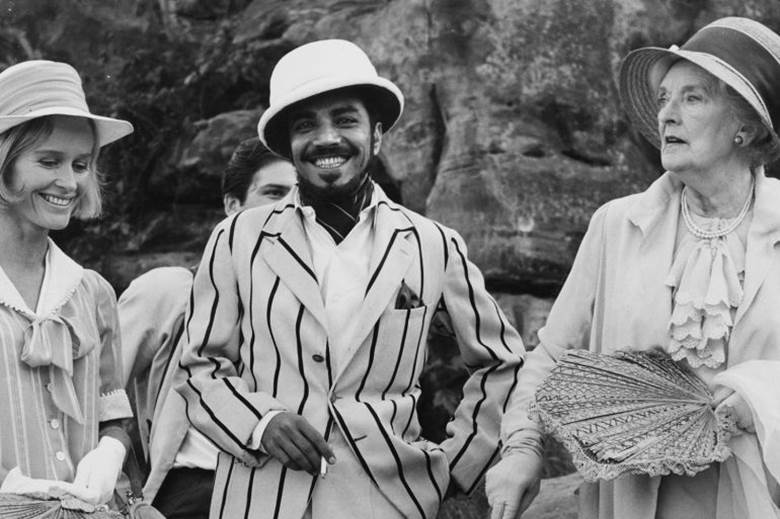
Mohyeddin, centre, with actors Virginia McKenna, left, and Dame Sybil Thorndike during the filming of BBC TV drama, A Passage to India, in Tunbridge Wells, England - File: Reg Speller/Fox Photos/Getty Images
Zia Sahib came on to the stage and introduced us to his Guldasta (Flower Bouquet) and started with a short poetic verse in Urdu. A lady in the audience (it was a gathering of less than a 100 people) felt the need for a sugar fix and decided to unwrap and consume some candy. Unfortunately, it was during a moment of pin drop silence while we waited for Zia Sahib to continue his performance. The entire room heard the wrapper being torn and the candy being consumed. Zia Sahib was not pleased but did not reprimand. He suddenly switched to a short and powerful monologue in Shakespearian English which clearly made a strong point on Mushaira (poetry recital) etiquette. In both English and Urdu language delivery, Zia Sahib was an absolute master.
The second time was when I was privileged (thanks to journalism) to meet Zia Sahib one on one as he, along with our Cricket hero and hospital builder (and presently incarcerated former Prime Minister) attended a gathering of Pakistani American affluence and influence in Atherton, California. As Khan Sahib was the center of attention at this event, the hosts guided me to a room where Zia Sahib was resting on a couch. Instead of being disturbed he expressed an interest in who I was and what I was doing there. And once he found out he relaxed. He liked to imbibe and was often lost in thought. But when called to take the podium, he gave one of the finest performances in Urdu that I ever heard.
The third time was at a fundraising event organized by the San Francisco Bay Area chapter of The Citizens Foundation or TCF then headed by the late Amjad Noorani. The event was held in Mountainview, California. 2011 was the year of the Faiz Ahmed Faiz centenary, so there was added significance placed on the Faiz & Zia partnership here. The two had a long association, especially in London, where Faiz Sahib was in exile during General Zia’s military dictatorship in Pakistan in the late 1970’s and early 1980’s.
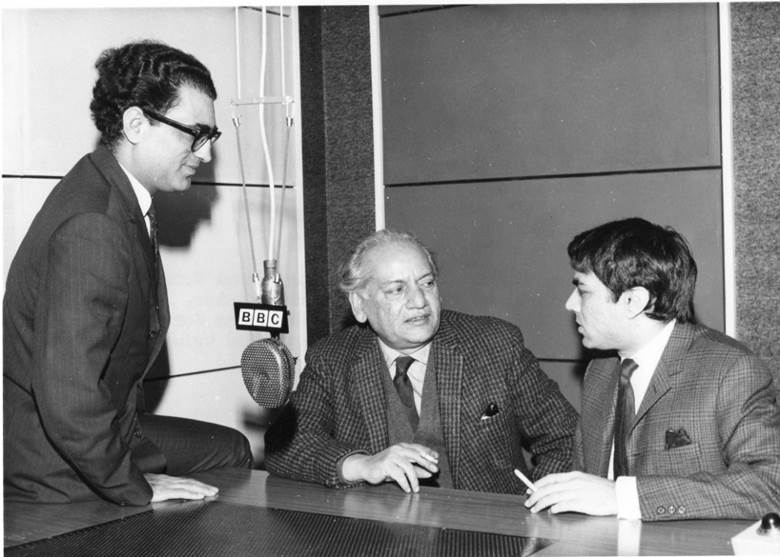
Asif Jilani, Faiz Ahmed Faiz with Zia Mohyeddin in BBC Studios, 1968 - Photo Courtesy Dr Ghulam Nabi Kazi , Flickr
It was a cold and rainy night in Mountainview and Zia Sahib with a glass of his favorite beverage in hand was shivering when I met him. I expressed surprise and said that for someone who had spent so many years in London, our San Francisco Bay Area winters should not be challenging. He replied that during all his time in England he made sure that the temperature in his room there was never below 80 degrees!
But once Zia Sahib took to the stage any cold discomfort which he may have felt earlier disappeared. Listening to him recite could be mesmerizing and a nightmare for this or any other writer. The reporting angle quickly went out of the window as he immersed us in Faiz Sahib’s poetry and life through him. What an evening it turned out to be.
We believe that the length of one’s life remains in the hands of the Creator. It is how one lives that life and touches the lives of others that matters. Zia Sahib bowed out in February 2023 at the age of 91. While we expressed sadness and offered our condolences to his family, we Pakistanis, who are often economical with our praise, should also consider ourselves privileged that he was one of us.

